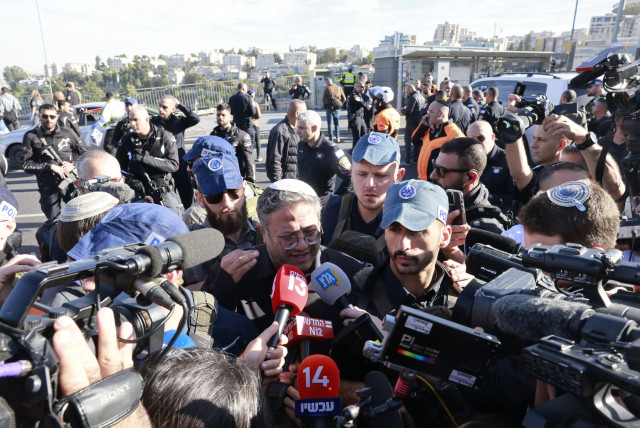Can Ben-Gvir ensure personal security for Israelis? - opinion

Given Ben Gvir’s ideological background and the statements he has made, it may be foolish to ignore the direction in which he is leading his ministry and the dangerous impact it could have.
Purim 2018: Then-lawyer and far-right activist Itamar Ben-Gvir announces on the radio that he is dressing up as Elor Azaria, a soldier convicted of manslaughter for killing an incapacitated terrorist in Hebron in 2016.
The Azaria case became a political football, with his supporters arguing that he was totally justified in killing the terrorist, even though he was no longer a threat. When asked why he was dressing up as Azaria, Ben-Gvir, now minister of national security, answered, “I want my kids to know that terrorists need to be killed.”
One of his catchier election slogans was “Death to terrorists,” and its practical implications should include, in his view, death penalties for terrorists. In his words, “Terrorists should only leave the scene of a terror attack eliminated.”
In many ways, Ben-Gvir’s success in the last election rode on the back of his campaign to restore personal security to Israelis. Given his stated political agenda since becoming a senior cabinet minister one year ago, we can piece together what his vision looks like.
The consequences of Ben-Gvir's vision
If realized, parts of that vision could undermine Israel’s democratic foundations, and under the cover of the war with Hamas, there are opportunities for him to accelerate its realization. Given the structure of the current coalition, it is unlikely this government would do anything to stop him. His dream could become Israel’s nightmare.
Ben-Gvir’s ministerial responsibilities include the police and the prison service. He has spent much of his time as minister encouraging the Israeli public to apply for gun licenses, and since the October 7 Hamas attacks, he has been pressing very hard to arm multiple first-response teams across the country. The other major arm of his policy includes the formation of a reserve-based national guard. He has worked hard to ensure that this force would come under the direct control of the ministry rather than under the chief of police.
SINCE THE outbreak of the war with the Hamas, the number of applications for a gun license has skyrocketed. The existing bureaucratic infrastructure is simply unable to handle the number of requests. In response, the Knesset speaker, with the approval of the minister, set up a committee to process applications with Knesset employees.
The solution blurs the lines drawing the key separation of powers between the legislative and executive branches. And this may not be the most serious issue.
The minister set up his apparatus for approving licenses with his political appointees, conducted from his office. There are now allegations that the process was applied in such a way as to give preference to some over others, and again with the suggestion that people and places close to the minister found themselves at the top of the queue.
After a hearing at the Knesset looking into these allegations, the head of gun licensing within the national security ministry has resigned, but not before writing to the minister, warning of the consequences of his policy. Sailing near the wind should surprise nobody, given Ben-Gvir’s personal history.
ZMAN EMET, KAN News’s documentary program, highlighted on December 10 the existence of privately organized armed groups that have developed around the country and do not see themselves under the strict authority of the police. Two of the groups highlighted are led by politicians from Otzma Yehudit, the party Ben-Gvir leads, and the Likud. Moshe Ben-Zikri is the Otzma Yehudit candidate for mayor of Harish, and Rafi Kedoshim is the head of the Likud list for the municipal elections in Herzliya.
On camera, they made statements that closely matched those of the minister, including calling for the death of terrorists and saying that no terrorist should leave the scene alive. In Kedoshim’s words, “I saw a shabah (meaning a Palestinian from Judea and Samaria without a work permit), or however you want to call him. I call him a terrorist. If, heaven forbid, a terrorist falls into our hands, he won’t leave the scene alive.” How amazing to hear the rhetoric of the far-right Kahanists from the mouth of an official candidate of the Likud.
Ben-Zikri is a well-known activist on the Kahanist scene and the founder of Shomrei Ha’aretz (“Guardians of the Land”). In the documentary program, the journalist asks, “What does Itamar [Ben-Gvir] say about your organization?” Without blinking an eye, he replies, “Itamar gives us his blessing… It can be the foundation of his National Guard.”
Roni Singer, the KAN journalist behind the documentary, tweeted last Thursday that since the airing of the program, she has received additional reports of similar private militias.
As for the arming of new security personnel to be trained as first responders in towns and settlements, it appears, according to several media reports, that those not willing to participate in a photo-op with Ben-Gvir at the ceremony giving out the guns and those who were involved in the anti-legal reform protests will not be part of the new groups. If true, then another piece of the politicization of Israel’s internal security becomes apparent.
YUVAL DORON CASTLEMAN responded to a terror shooting in Jerusalem on the morning of November 30. Licensed to carry a gun, he immediately killed the terrorists, thereby preventing an even bigger tragedy. However, this was not the end of the incident. A soldier returning from leave arrived on the scene and mistook Yuval for the terrorist. What happened next is now the subject of a police investigation, but Castleman, on his knees with his hands up and calling out in Hebrew that he was not a terrorist, was shot multiple times, leading to fatal injuries.
We cannot read the mind of the shooter, nor can we jump to conclusions on the sequence of events, but while Castleman represents exactly what good citizenry in Israel looks like, he may have paid the price for the rhetoric that is now well-established within parts of the Israeli discourse that terrorists do not leave the scene of an attack alive. Before realizing that he had killed the hero, the shooter managed to take credit for the kill in a live interview in which he was naturally framed as the hero.
ALL ISRAELI conscripts are taught to respect their weapons and internalize the strict rules of engagement. This is a combination of ethics and tactics and has meant that despite the high number of military and privately owned weapons, there is relatively little gun crime in Israel. Lowering the bar to qualify for a gun license, along with populist rhetoric about the use of those weapons, combined with a growing number of armed citizens who do not necessarily see themselves as working within the law, may be a cocktail that will dramatically change Israel’s gun culture.
All this is against the backdrop of Ben-Gvir’s political messaging and the traumatic effects on all Israelis of the Hamas attacks on towns and kibbutzim on October 7. Israelis’ sense of personal security one year into Ben-Gvir’s tenure has seen a dramatic degradation, and it’s too early to forecast how that will affect Israeli society and politics. Worryingly and ironically, it may even lead to an increase in his popularity.
In On Tyranny, Timothy Snyder describes a series of political and societal developments that, combined, can be the harbingers of a shift from democracy to tyranny.
One of those is the development of uniformed and non-uniformed paramilitaries. Given Ben Gvir’s ideological background and the statements he has made, it may be foolish to ignore the direction in which he is leading his ministry and the dangerous impact it could have on the country.
The writer is a founding partner of Goldrock Capital and the founder of The Institute for Jewish and Zionist Research. He is a former chair of Gesher, World Bnei Akiva, and the Coalition for Haredi Employment.
Jerusalem Post Store
`; document.getElementById("linkPremium").innerHTML = cont; var divWithLink = document.getElementById("premium-link"); if (divWithLink !== null && divWithLink !== 'undefined') { divWithLink.style.border = "solid 1px #cb0f3e"; divWithLink.style.textAlign = "center"; divWithLink.style.marginBottom = "15px"; divWithLink.style.marginTop = "15px"; divWithLink.style.width = "100%"; divWithLink.style.backgroundColor = "#122952"; divWithLink.style.color = "#ffffff"; divWithLink.style.lineHeight = "1.5"; } } (function (v, i) { });

